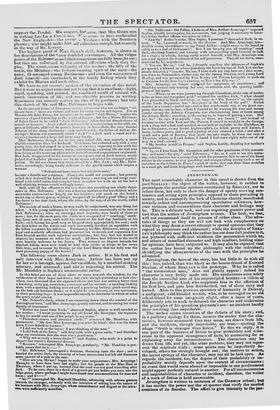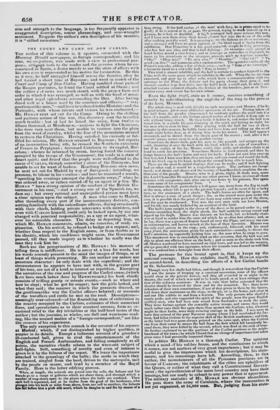JERNINGRAM.
THE most remarkable character in this novel is drawn from the poet SHELLEY: the object of the writer, however, is neither to promulgate the peculiar opinions entertained by SHELLEY, nor to refute them, but only to show the danger of openly avowing sen- timents and acting upon principles opposed to those prevailing in society, and to exemplify the lack of Christian charity manifested towards ardent and uncompromising speculative reformers, how- ever virtuous and conscientious their character and feelings may be. This is a delicate task, and one requiring greater power and tact than the author of Jerningham evinces. The book, we fear, will not recommend itself to persons of either class. The advo- cates of things as they are will not look with complacency on what they may deem a covert attempt to spread opinions that they regard as pernicious and abhorrent; while the disciples of SHIM.. LEY.S philosophy may think the author has not done full justice to it, nor pictured with sufficient vividness the persecution which be, and others of unsullied character and high intellect, holding simi- lar opinions, have been subjected to. It may also be objected that the author has bound up the philosophy with the individual; identifying the idiosyncracics of the man with the principles he advocated.
Jerningliam, the hero of the story, has but little to do with all this ; less, indeed, than was likely as the bosom-friend of Everard Sinclair, of whom SHELLEY is the prototype. Why he is called " the inconsistent man," does not plainly appear : indeed his character is very feebly made out. His misfortunes arise solely from the successful arts of his unprincipled brother—a villain ost the Joseph Surface kind, who supplants him in the affection of his first love, and gets him disinherited, out of sheer envy and hatred. Akin to this precious specimen of humanity is Delaval, a malignant, cold-blooded wretch, who, to be revenged on an old school-friend for some imaginary slight, after a lapse of years, deliberately sets to work to debauch the character and undermine the principles of his quondam playmate's son: an incident hardly more revolting than improbable. The author seems conscious of the defects of his story ; and, in a prefatory apology for them, assures the reader that the cha- racters, however unnatural they may seem, are drawn from life, and the incidents, though improbable, are true,—quoting the adage "truth is stranger than fiction." To this we reply, it is one part of the business of fiction to give probability and cohe- rence to the apparent strangeness of facts, by accounting for Or explaining away the inconsistencies. The characters may be drawn from life, and yet, like other portraits, they may not repro- sent the originals truly : some points may be imperfectly de- veloped, others too strongly brought out; the motives to action, the secret springs of the character, may not all be laid open. As regards the incidents, too, the degree of their probability or im- probability mainly depends upon the context of circumstances:. an event that would seem absurd or impossible in one predicament might appear perfectly natural in another. For all inconsistencies and improbabilities of character or incident, therefore, the writer of a work of' fiction is held answerable.
Jerningham is written in imitation of the GODWIN school; but it has neither the power nor the eh quence that vivify the morbid creations of its founder. The effort to give intensity to the pea- sion and strength to the language, is too frequently apparent in exaggerated description, coarse phraseology, and over-wrought sentiment. To quote the author's own description of his manner, it is "stilted caricature."



























 Previous page
Previous page